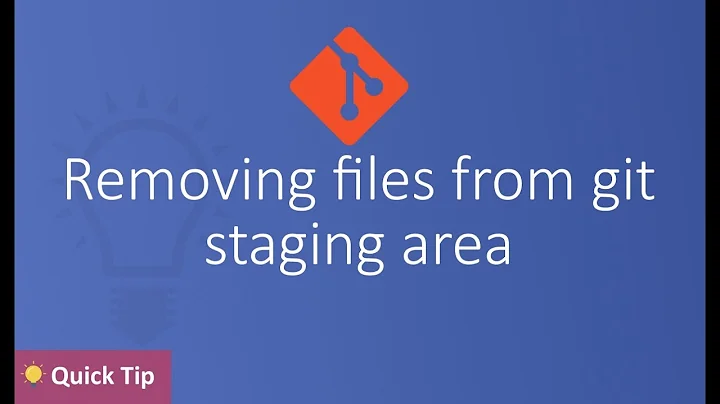Git removing upstream from local repository
Solution 1
Using git version 1.7.9.5 there is no "remove" command for remote. Use "rm" instead.
$ git remote rm upstream
$ git remote add upstream https://github.com/Foo/repos.git
or, as noted in the previous answer, set-url works.
I don't know when the command changed, but Ubuntu 12.04 shipped with 1.7.9.5.
edit: a few people seem to have run into a situation where they do not have an "upstream" remote. execute cat .git/config and look at the name of the remote(s). (if on windows and not using powershell you can use type .git/config.)
the output will show the remotes configured for your git repo, e.g.,
[remote "origin"]
substitute the name of the remote you wish to remove as:
$ git remote rm origin
if you don't have the "upstream" remote, you can't remove it.
Solution 2
git remote manpage is pretty straightforward:
Use
Older (backwards-compatible) syntax:
$ git remote rm upstream
Newer syntax for newer git versions: (* see below)
$ git remote remove upstream
Then do:
$ git remote add upstream https://github.com/Foo/repos.git
or just update the URL directly:
$ git remote set-url upstream https://github.com/Foo/repos.git
or if you are comfortable with it, just update the .git/config directly - you can probably figure out what you need to change (left as exercise for the reader).
...
[remote "upstream"]
fetch = +refs/heads/*:refs/remotes/upstream/*
url = https://github.com/foo/repos.git
...
===
* Regarding 'git remote rm' vs 'git remote remove' - this changed around git 1.7.10.3 / 1.7.12 2 - see
Log message
remote: prefer subcommand name 'remove' to 'rm'
All remote subcommands are spelled out words except 'rm'. 'rm', being a
popular UNIX command name, may mislead users that there are also 'ls' or
'mv'. Use 'remove' to fit with the rest of subcommands.
'rm' is still supported and used in the test suite. It's just not
widely advertised.
Solution 3
$ git remote remove <name>
ie.
$ git remote remove upstream
that should do the trick
Solution 4
In git version 2.14.3,
You can remove upstream using
git branch --unset-upstream
The above command will also remove the tracking stream branch, hence if you want to rebase from repository you have use
git rebase origin master
instead of git pull --rebase
Related videos on Youtube
user2603138
Updated on June 30, 2021Comments
-
user2603138 almost 3 years
I am working with a ruby on rails application and I am trying to sync a fork. It is worth mentioning that I am also on a Mac. I committed the following action:
$ git remote -vto get a view of my local repository. I messed up when trying to go
upstream:$ git remote add upstream https://github.com/foo/repo.gitWhen I should have capitalized Foo:
$ git remote add upstream https://github.com/Foo/repos.gitThe question is how do I remove the
upstreambecause every time I try and change this it comes back with creating afatalerror? -
Michael Scheper almost 10 yearsThis answer seems to require updating. In git 1.7.9,
git remote remove upstreamproduces 'error: Unknown subcommand: remove' -
Jason almost 5 yearsThis worked perfectly for my branch with 2 different upstreams
-
 Guy almost 3 yearsOn Windows, it returns the error
Guy almost 3 yearsOn Windows, it returns the errorusage: git remote remove <name>but doesn't remove the upstream. -
 bmacnaughton almost 3 yearsit returns that when you execute
bmacnaughton almost 3 yearsit returns that when you executegit remote rm upstream? thanks - i don't use windows much for development. -
user1709076 almost 3 yearsfatal: No such remote: 'upstream'
-
user1709076 almost 3 years'git remote rm master' gives me "fatal: No such remote: 'master'"
-
 bmacnaughton almost 3 yearstry 'git remote rm upstream`
bmacnaughton almost 3 yearstry 'git remote rm upstream` -
moudug almost 2 yearsThis answer seems the good one in 2022







